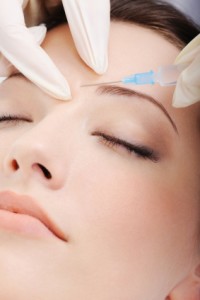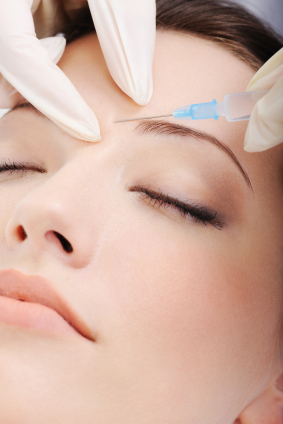Botox for Depression
 Several recent clinical trials have suggested that Botox injections between the eyebrows may improve depression. The theory is that decreasing muscle tension could reduce feelings of depression, instead of depression causing muscle tension. In a phase 2 double blind multicenter trial of 258 women with depression, participants were randomized to receive 30 units of Botox, 50 units of Botox, or placebo. Those who received the 30-unit injections showed significantly greater improvement in depression at three weeks and nine weeks compared to those who received placebo. However, it was not superior to placebo at the primary endpoint of the study, six weeks, and the 50-unit dosage was not superior to placebo. Both doses were well tolerated.
Several recent clinical trials have suggested that Botox injections between the eyebrows may improve depression. The theory is that decreasing muscle tension could reduce feelings of depression, instead of depression causing muscle tension. In a phase 2 double blind multicenter trial of 258 women with depression, participants were randomized to receive 30 units of Botox, 50 units of Botox, or placebo. Those who received the 30-unit injections showed significantly greater improvement in depression at three weeks and nine weeks compared to those who received placebo. However, it was not superior to placebo at the primary endpoint of the study, six weeks, and the 50-unit dosage was not superior to placebo. Both doses were well tolerated.
Botox is derived from botulinum toxin, which can relax tense muscles. It is also being explored as a treatment for migraine headaches. The manufacturer, Allergan, expects to move forward with phase 3 trials of Botox for depression.
Botox May Improve Depression
 Relaxing facial frown muscles with Botox may produce antidepressant effects. The muscles on the forehead between the eyebrows tend to tense and constrict during episodes of depression, anxiety, and grief. A placebo-controlled clinical trial by Eric Finzi and Norm Rosenthal has shown that paralyzing these frown muscles can produce antidepressant results.
Relaxing facial frown muscles with Botox may produce antidepressant effects. The muscles on the forehead between the eyebrows tend to tense and constrict during episodes of depression, anxiety, and grief. A placebo-controlled clinical trial by Eric Finzi and Norm Rosenthal has shown that paralyzing these frown muscles can produce antidepressant results.
Study participants with treatment-resistant depression received either paralyzing injections of botulinum toxin, better know by its trade name Botox, or placebo injections. The antidepressant response rate was 51% among patients who received Botox and 14% among those who received placebo. The remission rate was 27.3% with Botox versus 7.3% with placebo injections. These data are particularly striking because these patients had, on average, been ill for more than two years, during which time they had been through multiple unsuccessful antidepressant trials.
In 1872, Charles Darwin emphasized the importance of facial muscles in social communication and affect, and in 1890 William James suggested that sensory feedback from musculature changed people’s affect, rather than the opposite and conventional view that affective and emotional states cause muscles to tense and contract. The new data from Finzi and Rosenthal’s study are consistent with James’ view.
The investigators concluded that the data from this study suggest frowning itself may cause depression. More controlled trials using other injection sites would be helpful to further document the efficacy and selectivity of these Botox injections for the treatment of depression.

